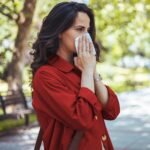If it’s due to an infectious process, Maselli recommends seeking medical help and staying well hydrated: “Hydration is essential because if you have secretions, it helps regulate them.”
According to internist Aldrin Aroche, there are many causes of a chronic cough. For example, patients with asthma, those undergoing treatment for bronchitis, gastroesophageal reflux disease, and even some medications.
When coughing, it plays an important role in clearing and expelling phlegm from the airways. It’s more important to treat the underlying cause, which could be an infection, fluid in the lungs, or an allergy. For example, with medical supervision, antibiotics may be prescribed if it’s an infection or antihistamines if it’s an allergy.
Cough medicines can be used to treat a dry cough, which is not accompanied by expectoration.
Antihistamines dry out the respiratory tract and are of little use in treating coughs, except when they are caused by allergies or the common cold and are in their initial stages. When the cough is caused by something else, the drying action of antihistamines can be counterproductive.
Respiratory tract care
Gerardo Martínez, a physician, surgeon, and pulmonologist, explains that there is no single vitamin that helps us or a magic food that allows us to maintain lung health.
For Martínez, among the cheapest but most difficult preventative medicines for the population are exercising regularly, not smoking , and sleeping between six and eight hours a day.
For his part, Francisco Orlandi, oncologist and head of the Oncology Medicine Unit at the National Thoracic Institute in Santiago, Chile, reflects that quitting smoking is a way to maintain lung health and reduce future deaths from lung cancer. In Latin American countries, cooking with firewood and charcoal should also be avoided, as they pose a risk.
Nutrition is a key focus. There is no single food that strengthens the immune system; it all depends on healthy eating habits, on a varied, high-quality diet that provides the nutrients necessary for optimal health and nutrition.
Consuming fruits and vegetables ensures adequate intake of micronutrients (vitamins and minerals) and thus helps strengthen the immune system.
It is generally recommended to include a food from all food groups on your plate at each meal. A very practical idea to make your plate look and feel healthy is to consider divisions, such as the healthy eating plate: ¼ cereals, ½ vegetables and/or fruits, ¼ foods of animal origin.






















+ There are no comments
Add yours